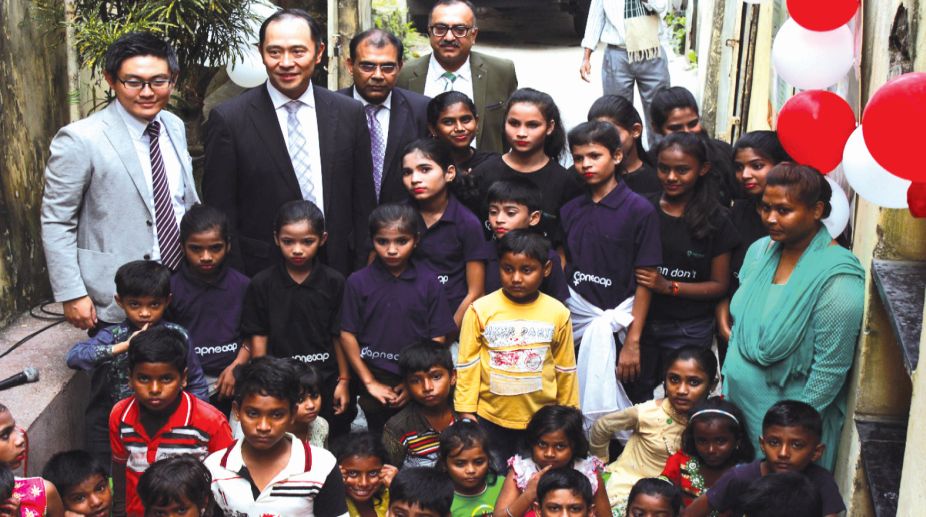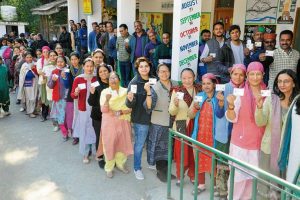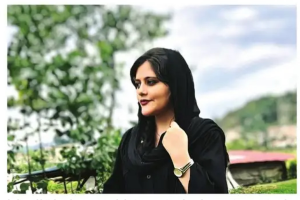Dolly is a 16-year-old girl who comes from the red light area at Khidderpore, Kolkata. She is full of liveliness and innocence like any other girl of her age. In a short film named Kaali, made by the girls from this community, what Dolly narrates most innocently about witnessing women and girls around her being beaten and taken away for trafficking, is really hard hitting.
She is a devotee of Goddess Kali and dreams that one day the Goddess will punish the sinners, dotingly put the helpless women on her lap and lead them to safety. She believes that her dream has come true and the idol of Goddess Kali has come alive in one of the aunts at a training centre she goes to. She describes this aunt as, “one who looks like a foreigner but speaks with us in Bengali. She visits our red light area and teaches the kids there, fights with the pimps and raises her voice against sex trafficking.”
This aunt Dolly speaks about is Tinku Khanna, executive director of Apne Aap Women, an organisation that caters to trafficking victims. It has three centres, in Bihar, Kolkata and Delhi. The centre in Kolkata was started in 2003 at Topsia and Khanna being one of the oldest staff of the organisation has watched it grow.
Apne Aap Women Worldwide was founded by Ruchira Gupta in August 2002. Gupta was a journalist who made the first ever documentary on human trafficking named The Selling of Innocents (1996). There were 22 trafficking survivors from Mumbai who were involved in the documentary. When she inquired if she could help them in anyway, they said that they wanted a shelter where no one could exploit them, a regular job where they could work with dignity and to save their children from prostitution. Considering their wishes, Gupta started the organisation in Mumbai. Sadly, 21 of those 22 women died of HIV.
The organisation works in the Najafgarh area in Delhi where caste-based prostitution is prevalent. They have adopted two schools from the area, which mainly caters to the children from these communities. “We believe that children should be the primary focus in the process of providing protection. Instead of going by the raid and rescue method that comes with challenges, like not being able to win the children’s trust, intervention is made through their mothers. Thus we help when there is participation from the communities’ side. An even more sustainable method is to try and convert red light areas into non-red light ones,” said Khanna.
The organisation embraces asset-based community development by increasing livelihood choices for the victims so that dependence on the brothel systems can be reduced. It provides them with safe space and education and admits the highly vulnerable victims to residential schools. “In Bihar we run our own residential school with support from the government under the Sarva Shikshya Abhiyaan. These schools act as excellent preventive measures as they are away from the community yet not totally removed from it,” she said.
They also ensure that the victim possesses vital citizenship documents like a caste certificate, birth certificate and voter card that would guarantee them the basic benefits like any other citizen. About providing linkages to livelihood, Khanna said, “We let the victims decide their own exit strategy. For example, if any woman from our group wants to earn her living by selling vegetables, we issue bank loans for them.”
Writing workshops to imbibe self-confidence are organised in a sit-in-circle method in red light areas like Sonagachi. They publish a journal named Red Light Dispatch, which voices the stories of marginalised women and children. Some of the other activities include karate, mimes, dance and filmmaking workshops.
Political empowerment is also emphasised upon through slogan writing, participation in rallies and interacting with the political representatives. “One of our girls named Kumkum Chetri testified in Parliament when the Immoral Traffic Prevention Act was passed,” she said.
Khanna spoke most indignantly of the societal attitude towards these victims. “Patriarchy is controlling women by naming and shaming to such an extent that these women start looking at themselves as fallen and not fit for society,” she said. “Whenever they feel ashamed, we explain to them that it wasn’t their fault to have been trafficked at the age of nine or 10. Naming and shaming should happen to those people who are responsible for trafficking and are yet living proudly,” she added.
Talking about direct physical threats and other challenges under which the organisation has to work, she stated instances of her colleague’s daughter being kidnapped, another’s sister being sent to police lock up and a boy from the community being trapped on false cases since he went against the traffickers.
“The sex industry thrives because a demand is created by the traffickers and buyers. Sexual exploitation is prevalent everywhere and has become like an institution now. These girls are made to believe that it is like any regular job. Thus the area is so entrenched, that to even speak up against it poses a huge challenge,” she said.
Sharing the success stories of the organisation, she said that the son of one of the victims has come first in the inter-school quiz competition and received the prize from the Governor of West Bengal. A girl from Bihar, who first came to study in their residential school, is now studying at St Xavier’s College, Kolkata. As many as 13 other girls from Bihar’s red light areas are also pursuing higher studies. Two girls from the Kolkata centre are working in responsible positions in one of the petrol pumps in the city — one as manager and the other as an administrator. Both of them have taken their mothers from the centre and given them a normal life.
“According to me our biggest success was when we acted as a medium between the Parliament and our girls when the Criminal Law (Amendment) Act 2013 was passed. While debate was on at the Parliament and issues like stalking, sexual harassment and prostitution were being raised, we conducted a series of discussion with the women in our centres. We made them aware of the provisions proposed for the Act and recorded the life experiences, which they shared. These recordings were played before parliamentarians and they admitted that it was really impactful and gave them a new perspective regarding structuring the Act. The women’s voices helped strengthen it,” said Khanna.











